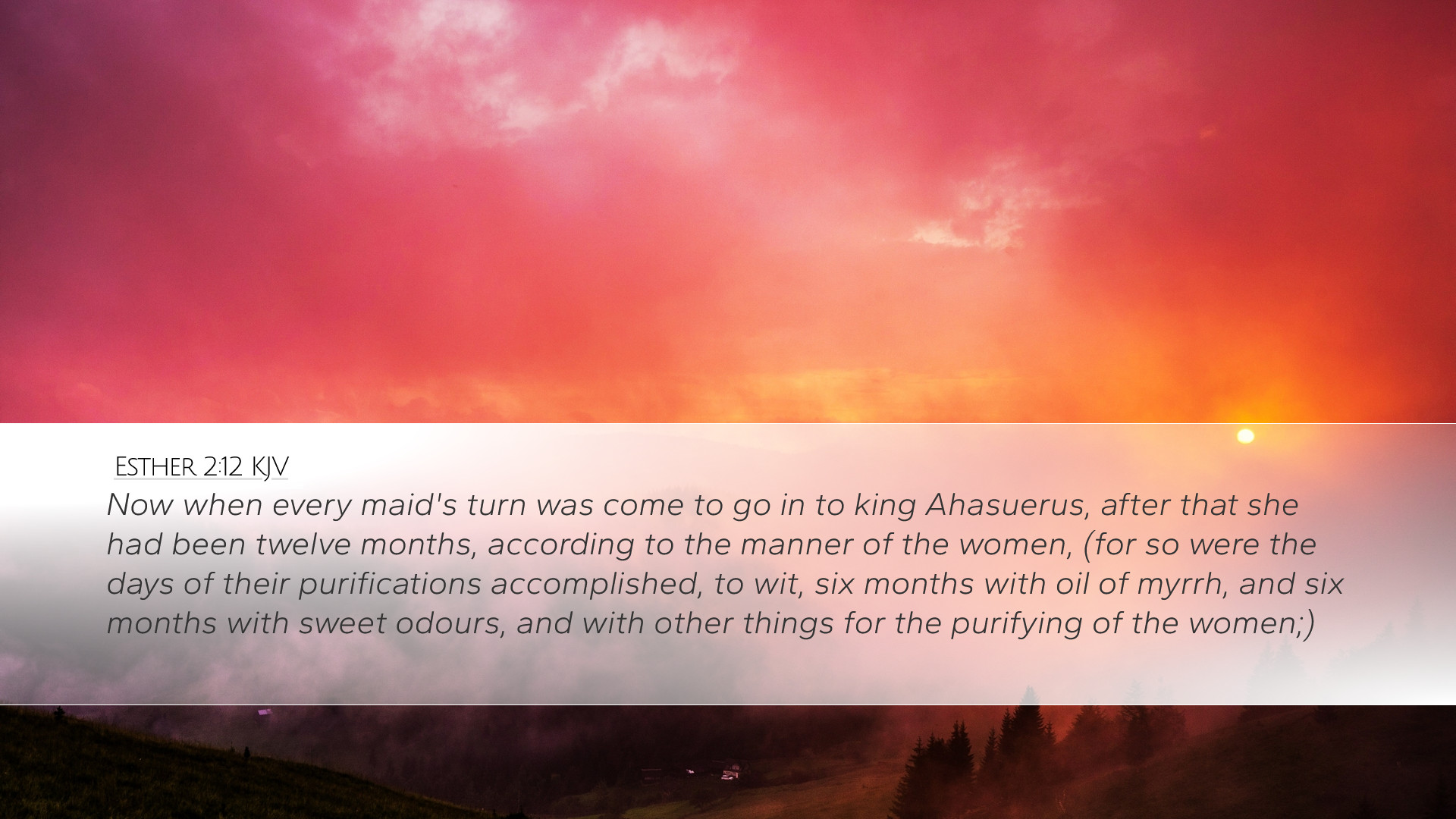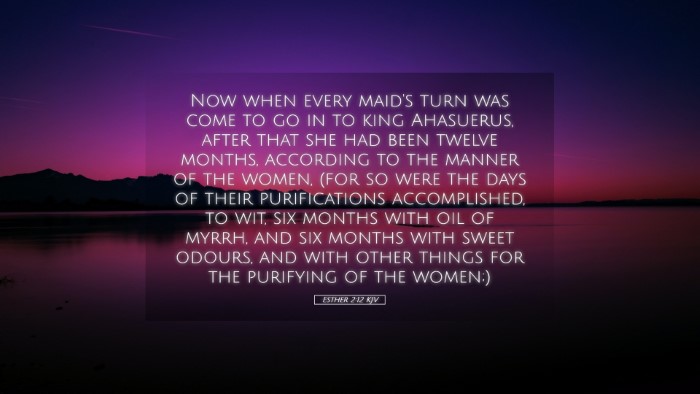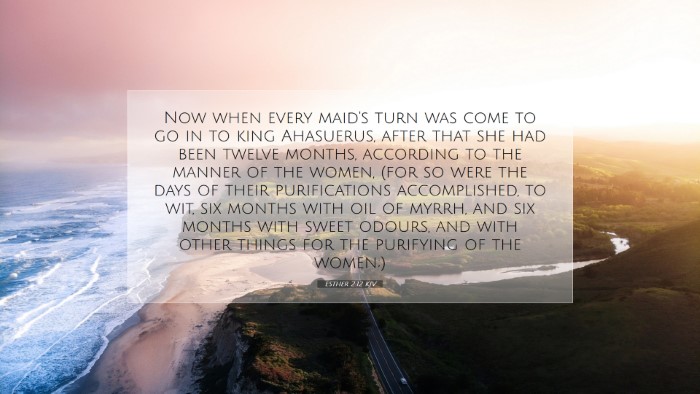Old Testament
Genesis Exodus Leviticus Numbers Deuteronomy Joshua Judges Ruth 1 Samuel 2 Samuel 1 Kings 2 Kings 1 Chronicles 2 Chronicles Ezra Nehemiah Esther Job Psalms Proverbs Ecclesiastes Song of Solomon Isaiah Jeremiah Lamentations Ezekiel Daniel Hosea Joel Amos Obadiah Jonah Micah Nahum Habakkuk Zephaniah Haggai Zechariah MalachiEsther 2:12
Esther 2:12 KJV
Now when every maid's turn was come to go in to king Ahasuerus, after that she had been twelve months, according to the manner of the women, (for so were the days of their purifications accomplished, to wit, six months with oil of myrrh, and six months with sweet odours, and with other things for the purifying of the women;)
Esther 2:12 Bible Commentary
Commentary on Esther 2:12
Esther 2:12 states: "Now when every maid's turn was come to go in to king Ahasuerus, after that she had been twelve months, according to the manner of the women, for so were the days of their purifications accomplished, to wit, six months with oil of myrrh, and six months with sweet odours, and with other things for the purifying of the women."
Contextual Background
The book of Esther is unique as it is one of the two books in the Bible named after a woman. This narrative unfolds in the Persian Empire during the reign of King Ahasuerus, widely identified with Xerxes I. The text describes the Jewish exiles and highlights themes of providence, divine sovereignty, and the role of women in God's plan.
Historical Insight
The context of Esther 2:12 reveals the customs surrounding royal courtship in ancient Persia. Young women were taken to the king for a year of preparation. This process reflects societal norms and expectations regarding beauty and femininity during that era.
Preparations for Royal Entrance
- Duration of Preparation: The twelve-month period for purification signifies the seriousness with which the Persian court regarded appearances and the arduous journey each maid undertook to be presented to the king.
- Use of Myrrh: Myrrh, used for six months, is significant as it denotes both physical beauty and a symbol of mourning, hinting at the deeper struggles the participants may face.
- Aromatic Treatments: The sweet odours associated with the remaining six months symbolize the desirability and sensuality expected in a queen, highlighting the delicate balance between allure and virtue.
Commentary Insights
Matthew Henry's Commentary
Matthew Henry emphasizes the divine hand in the selection of Esther, affirming that these meticulous preparations were not merely frivolous but served a strategic purpose within God's providential plan. He notes how the extensive beautification rituals indicate the high stakes involved in winning the king's favor as well as portraying God's guidance over events leading to Israel's preservation.
Albert Barnes' Analysis
Albert Barnes extensively explores the cultural implications of the verse. He remarks on how the customs of the Persian courts reflect a world where women were both objects of beauty and pivotal in political machinations. Barnes underscores the significance of these preparations, asserting that while seemingly outward, they can foreshadow Esther's inner strength and resilience in facing impending crises.
Adam Clarke's Observations
Adam Clarke provides additional insight by discussing the specific ingredients used for purification. His commentary suggests that these ingredients not only emphasize Esther's beauty but also serve as a metaphor for spiritual preparation. Clarke encourages readers to draw parallels between Esther's physical preparation and the need for spiritual readiness in their own lives before entering any significant endeavors or responsibilities.
Theological Reflections
Esther 2:12 serves as a profound reminder of the inherent value placed upon preparation in both spiritual and secular undertakings. The diligence of these maidens can inspire believers to approach their callings with seriousness and intentionality, understanding that God orchestrates events for His glory and purpose.
Symbolic Purification
The purification process can be compared to the believer's journey through sanctification. Just as Esther underwent a preparation process, Christians are prepared through trials and learning, ensuring readiness for God's assignments—ultimately leading to exalted positions in His kingdom.
Preparation as Providence
In examining God's providence, we find that the preparations described are not just for gaining earthly favor but are intricately woven into God's plan for the Jewish people. The narrative positions Esther, a Jewish woman, in a place where she could influence the outcome of a pivotal moment in history.
Practical Applications for Today
- Importance of Preparation: Just as Esther prepared for her role, Christians should prepare themselves spiritually and practically for the tasks God calls them to.
- Confronting Societal Expectations: The pressures Esther faced regarding beauty reflect modern challenges faced by individuals today, encouraging contemplation on true worth beyond societal standards.
- God's Sovereignty in Unlikely Circumstances: Esther's rise to prominence in the king's court demonstrates that God can work through unusual means and situations to fulfill His purpose.
Conclusion
Esther 2:12 reveals much beyond its immediate context; it inspires depth of understanding regarding preparation, beauty, and God's providence. By reflecting on this passage, pastors, students, and theologians can draw parallels to their own lives and recognize the roles they play in God's grand narrative. The emphasis on both internal and external preparation elevates the significance of how we approach divine calling and personal spiritual growth.


